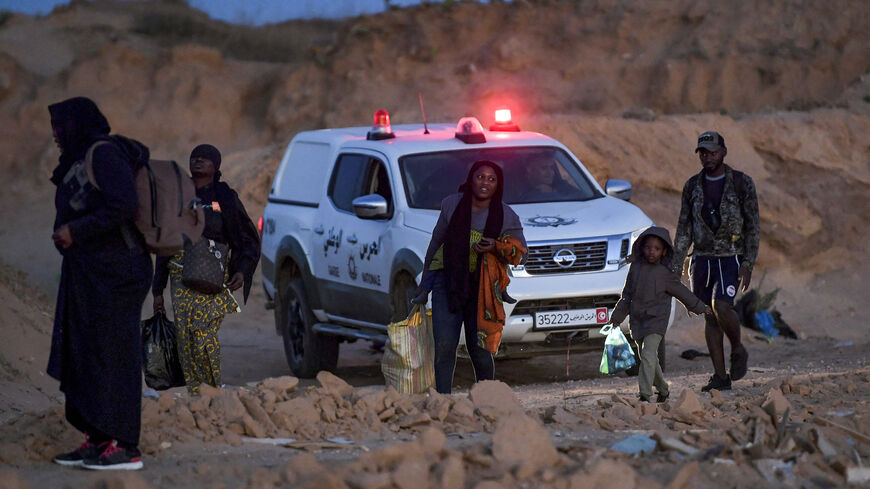TATAOUINE, Tunisia — The once bustling cafes in Tataouine, a remote desert town in southern Tunisia, are full of empty chairs. Their dwindling patrons, mostly young men, spend long afternoons sipping coffee or tea as they scroll idly through their phones, watch football or play cards. Many of these men are biding their time to clandestinely leave their home for western Europe, primarily France, Italy or Germany, following in the footsteps of tens of thousands of their compatriots who are already there.
It’s not hard to understand their urge to go. Despite Tataouine’s rich culture and heritage, with roots in Tunisia’s ancient Amazigh community, it has little to offer its youth. There are few good jobs, scarce investment and not much to pass the time (the town of about 80,000 has no operative theater or shopping mall and just one downtown bar atop a two-star hotel). The region’s economic engine — the El Kamour oil pumping station that generates nearly half of Tunisia’s oil — has been the site of on-and-off protests since 2017. And its main tourism draw — a neighborhood of Berber cave dwellings that inspired the original “Star Wars” film — attracts few visitors and is chronically under renovation.
Graduates of Tataouine’s two universities often remain jobless, battling a regional unemployment rate of 30%. Those that do find work often earn as little as 450 Tunisian dinars ($145) a month, hardly enough to live off, let alone save up for a house or start a family, residents told Al-Monitor.
Mohamed, a 28-year-old engineer from Tataouine who is a member of a local civil society organization, lamented the economic struggles pushing his neighbors to leave en masse. “Personally I have around 200 friends and acquaintances who have left for Europe in the past two years,” he told Al-Monitor from a near-empty cafe in the city center. “Everyone is suffering from an economic crisis and all the youth want to leave — with or without papers.”
By “without papers,” he means irregular migration, or “harka,” as it is referred to locally. For Tataouine’s class of migrants, mostly unemployed or working-class youth, it is the only way to reach their objective.
“Harka” is not a taboo topic in tight-knit Tataouine — it’s discussed casually and openly. Friends and families encourage youngsters to go, sometimes even pooling money to pay for the journey. The prospective migrants trade travel tips and liaise with smugglers in social media groups and forums.
While most Tunisian irregular migrants attempt to cross the Mediterranean Sea via makeshift boats or dinghies — a perilous journey that claimed more than 500 lives in 2022 — those from Tataouine take another approach: the “Balkan Route,” a carefully constructed smuggling line that runs from Turkey to Europe’s visa-free Schengen territory. The route, viewed as a safer alternative to sea crossings, is gaining popularity in other Tunisian regions, too — from January to October 2022, an estimated 15,000 Tunisians took this long trek, quadruple that of the previous year.
While less dangerous, the Balkan Route is grueling and costly. To make it through, migrants pay smugglers as much as 7,000 euros ($7,600), more than twice the average annual income in Tunisia. The most common path is a flight to Turkey and then Serbia. From there, smugglers guide them past the border to Hungary and, if they pay more, to Austria (the start of Schengen territory). The first steps of their land journey are the most challenging — migrants must hide out in forests in sub-freezing temperatures, scale spiked border fences and evade police who can sometimes turn violent, all the while placing their trust in a seedy smuggling network that has turned their desperation into a 50-million-euro enterprise.
One Tunisian migrant who recently took the Balkan Route to France called it a “nightmare,” saying smugglers left him and his companions in a wolf-infested forest in Serbia “for three days with no cell phones or passports” before sneaking them past the Hungarian border.
“The whole trip was full of risks and problems,” the migrant, who asked not to be named, told Al-Monitor. “But I’m so glad that I made it here [to France].”
For Tunisia’s next generation of migrants, the journey will likely be even more trying. On Nov. 10, 2022, Serbia, a crucial stop on the route, ended visa-free entry for Tunisians and Burundis, reversing a policy that had previously provided citizens of these countries much closer proximity to Europe’s Schengen territory.
Belgrade introduced the new scheme due to enormous pressure from the European Union, which had accused the Balkan nation of being a gateway for illegal migration and threatened to revoke its own visa privileges if it did not clamp down on it.
Serbia’s reputation as a smuggling hub and the EU’s concern are understandable. For years, Serbia’s border towns like Subotica and Sombor have attracted crowds of transient migrants, refugees and smugglers, who link up at well-known hostels or cafes to form an informal migration network. Some prominent Serbia-based smugglers have even been accused of collusion with high-ranking police to keep their operation running smoothly and of meting out violence to their rivals and clients to maintain control. Others, like the Moroccan smuggler known as “Yassin Kazawi,” have gained cult-hero status in North Africa for using the Serbia-Hungary crossing to usher thousands of Arab migrants into the EU and documenting claimed successes on social media.
Serbia’s reversal of its visa policy for Tunisians had an immediate impact on this transit route. In November 2022, the month Serbia’s new policy went into effect, the European Border and Coast Guard Agency, also known as Frontex, recorded a big drop in Tunisians intercepted along the Balkan Route, counting just 137 compared to 406 the month prior.
While smugglers are already reacting to the policy, promising new routes to their followers on social media, it is unclear how migration trends will evolve. However they do, it is clear that demand for smuggling services will remain — and determined migrants will continue to find ways to reach western Europe, even if at a higher risk.
Tasnim Abderrahim, a researcher with the Global Initiative Against Transnational Organized Crime, told Al-Monitor that “the underlying drivers of migration — unemployment, economic instability — are here to stay” and would continue to fuel mass migration, noting that we could see an uptick of sea crossings or new land smuggling routes.
“With new visa restrictions in Serbia, the Balkan Route will become longer, more dangerous and more expensive for Tunisian migrants, decreasing its appeal,” Abderrahim added. “As a result, maritime routes will continue to be the main path for Tunisian irregular migrants seeking to [head to] Europe.”
She went on, “As an alternative, Tunisian migrants could start their journey by land in Turkey, which is where the process begins for most other migrants [taking the Balkan Route], and smugglers can step in there.”
Mohamed from Tataouine agrees that migrants will not be deterred by the new restrictions in Serbia.
“This road from Tataouine to Europe will never end,” he told Al-Monitor. “Youth have their own ambitions and their own way of thinking.”
And while this path is fraught with challenges, Abderrahim said, Tunisians who have given up hope at home feel they have little left to lose.
“Youth are generally aware of the dangers and risks of irregular migration, but they feel the situation in Tunisia is even worse,” she said. “They tell themselves: ‘If I make it, I make it; if I don’t, I don’t. At least I can say I tried.'”







